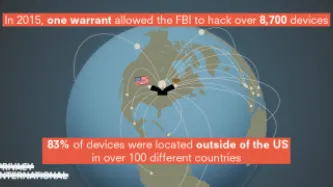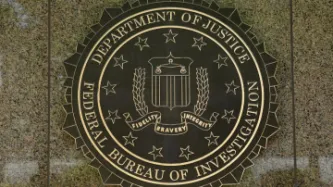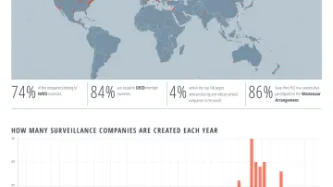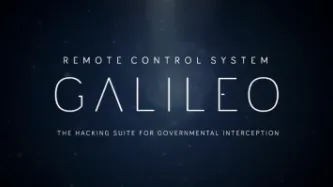Search
Content type: Press release
Privacy International Executive Director Dr Gus Hosein said:
“If today’s leaks are authenticated, they demonstrate what we’ve long been warning about government hacking powers — that they can be extremely intrusive, have enormous security implications, and are not sufficiently regulated. Insufficient security protections in the growing amount of devices connected to the internet or so-called “smart” devices, such as Samsung Smart TVs, only compound the problem, giving governments easier…
Content type: Long Read
Introduction
A growing number of governments around the world are embracing hacking to facilitate their surveillance activities. Yet hacking presents unique and grave threats to our privacy and security. It is far more intrusive than any other surveillance technique, capable of accessing information sufficient to build a detailed profile of a person, as well as altering or deleting that information. At the same time, hacking not only undermines the security of targeted systems, but also has…
Content type: Long Read
This piece was orignally published in Slate in February 2017
In 2015, the FBI obtained a warrant to hack the devices of every visitor to a child pornography website. On the basis of this single warrant, the FBI ultimately hacked more than 8,700 computers, resulting in a wave of federal prosecutions. The vast majority of these devices—over 83 percent—were located outside the United States, in more than 100 different countries. Now, we are in the midst of the first cases…
Content type: News & Analysis
This piece was written by PI Research Officer Edin Omanovic and originally appeared here.
Whatever happens over the next few years, if there is to be a storm, then it is best to prepare. It is essential that western liberal democratic societies are resilient enough to uphold their fundamental values.
One of the UK’s biggest security assets is one of its biggest security threats. The UK’s spies have access to and are allowed to exercise some of the most sophisticated electronic…
Content type: Press release
Privacy International has today written to government ministers, members of the opposition, and oversight bodies reaffirming its call for the UK government to reveal secret intelligence sharing arrangements with the United States.
The original UKUSA agreement — drafted shortly after World War II — allows UK and US agencies to share, by default, any raw intelligence, collection equipment, decryption techniques, and translated documents.
Current arrangements also allow US…
Content type: Long Read
This piece was written by Ashley Gorski, who is an attorney at the American Civil Liberties Union, and PI legal officer Scarlet Kim and originally appeared in The Guardian here.
In recent weeks, the Hollywood film about Edward Snowden and the movement to pardon the NSA whistleblower have renewed worldwide attention on the scope and substance of government surveillance programs. In the United States, however, the debate has often been a narrow one, focused on the…
Content type: Long Read
This week, Privacy International, together with nine other international human rights NGOs, filed submissions with the European Court of Human Rights. Our case challenges the UK government’s bulk interception of internet traffic transiting fiber optic cables landing in the UK and its access to information similarly intercepted in bulk by the US government, which were revealed by the Snowden disclosures. To accompany our filing, we have produced two infographics to illustrate the…
Content type: Press release
Key points
Privacy International, Liberty, Amnesty International, and seven other human rights organizations challenge UK mass surveillance and UK access to US mass surveillance at the European Court of Human Rights
This is the first case before the European Court of Human Rights to directly challenge UK and US mass surveillance revealed by the Snowden disclosures
National courts and oversight bodies have failed to rein in mass surveillance practices that impact hundreds of millions of…
Content type: News & Analysis
Privacy International is today proud to release the Surveillance Industry Index (SII), the world's largest publicly available educational resource of data and documents of its kind on the surveillance industry, and an accompanying report charting the growth of the industry and its current reach.
The SII, which is based on data collected by journalists, activists, and researchers across the world is the product of months of collaboration between Transparency Toolkit and Privacy…
Content type: Long Read
This piece originally appeared here.
On both sides of the Atlantic, we are witnessing the dramatic expansion of government hacking powers. In the United States, a proposed amendment to Rule 41 of the Federal Rules of Criminal Procedure would permit the government to obtain a warrant, in certain circumstances, to hack unspecified numbers of electronic devices anywhere in the world. Meanwhile, across the pond, the British Parliament is currently debating the Investigatory…
Content type: News & Analysis
Remember when the world didn't know what Prism was? Those were the days. While privacy advocates, civil libertarians, and technologists had suspected or posited the existence of an extensive surveillance regime operated by the U.S. government, few knew the details and the extent of the operation.
Undoubtedly, we know more now than we did a week ago about the National Security Agency's covert operations and how the agency routinely spies on nearly anyone in the world. The public, many…
Content type: Press release
The committee of data protection regulators across Europe, the Working Party 29, announced today its opinion on the current “Privacy Shield”. The Opinion is expected shortly, and based on the statements made by the Working Party chair in a press conference, we understand that the Working Party, while noting improvements from the annulled “Safe Harbor” agreement, has serious concerns about a range of aspects of the current "Privacy Shield" agreement with the U.S.
Overall they note the…
Content type: News & Analysis
Image source
This is a guest post by Zoë Blackler.
If you want to know how the UK came to be the most watched nation in the world, with CCTV on every corner, you need to go back to 1942: the now ubiquitous policing aid was first developed for use in missile testing by the German military.
Tear gas, GPS trackers, pain rays, and surveillance drones - technologies developed by the military for use against foreign enemies have a habit of finding their way into the hands…
Content type: News & Analysis
Should the European Union agree to legitimise trade with a country that refuses to adhere to European legal standards? This is the fundamental question that will be addressed at tomorrow’s meeting among European privacy regulators when they publish their opinion on the data-sharing agreement known as the ‘Privacy Shield’, the replacement to the failed ‘Safe Harbour’ agreement.
Background
Many of the world’s largest companies, such as Google and Facebook, store their customers’ data in…
Content type: News & Analysis
PI's full analysis can be read here
On 29 February 2016, the European Commission and the US government released the details of the proposed EU-U.S. “Privacy Shield”. The “Privacy Shield” replaces the now defunct so-called “Safe Harbor”.
The Privacy Shield is in fact a significant number of documents from various parts of the U.S. administration, which merely outline the existing, weak U.S. safeguards applicable to personal data of EU citizens. These documents are…
Content type: Advocacy
Introduction
On 29 February 2016, the European Commission and the US government released the details of the proposed EU-U.S. “Privacy Shield”. The “Privacy Shield” replaces the now defunct so-called “Safe Harbor”.
The Privacy Shield is in fact a significant number of documents from various parts of the U.S. administration, which merely outline the existing, weak U.S. safeguards applicable to personal data of EU citizens. These documents are meant to serve as the basis for an “adequacy”…
Content type: News & Analysis
We already know that in some countries, like the UK, governments are drafting laws to legalise and legitimise their incredible surveillance powers. In the U.S. we are seeing legislation that is using remarkably similar language on encryption and surveillance. The next phase of the cryptowars has openly begun.
Yesterday what is being called the Feinstein-Burr decryption Bill was introduced into the US Senate and leaked online. Whilst the short title ‘Compliance with Court Orders…
Content type: Long Read
The recent back and forth between Apple and the FBI over security measures in place to prevent unauthorised access to data has highlighted the gulf in understanding of security between technologists and law enforcement. Modern debates around security do not just involve the state and the individual, the private sector plays a very real role too. There are worrying implications for the safety and security of our devices. Today, a new company stepped in to this discussion -- though it had been…
Content type: News & Analysis
On Tuesday (16th February 2016) Apple posted a message to their customers stating that the company had been ordered by the FBI to “make a new version of the iPhone operating system, circumventing several important security features, and install it on an iPhone recovered during the investigation.” Apple are currently opposing this order. A fascinating debate is currently playing out in the media about whether Apple should comply with or resist the FBI's demands.
Whatever…
Content type: News & Analysis
According to Snowden documents analysed by Privacy International, the Australian Signals Directorate had access to and used PRISM, a secret US National Security Agency program which provides access to user data held by Google, Facebook and Microsoft.
This is the third spy agency of the 'Five Eyes' alliance confirmed to have had secret access to Silicon Valley company data - an alliance whose rules and policies remain classified. Earlier this year, a British court ruled that GCHQ access to…
Content type: News & Analysis
Privacy is a human right, and needs very clear legal protections. 'Safe Harbor' was clear as mud and placed privacy rights globally at risk.
Today's European Court of Justice decision should be no surprise for industry or governments. For over fifteen years the U.S. Government has resisted implementing basic and effective privacy law and created absurd stopgap measures because U.S. Congress is incapable of acting upon what consumers and citizens have long asked for. The fact over 100 countries…
Content type: Press release
Human Rights Watch and three individuals have today lodged a legal challenge to establish whether their communications were part of those unlawfully shared between the US National Security Agency (NSA) and UK Government Communications Headquarters (GCHQ).
Despite billions of records being shared every day between the NSA and GCHQ, and that historical sharing having been declared unlawful [PDF], the Investigatory Powers Tribunal (IPT) has not yet confirmed to any claimant that their…
Content type: News & Analysis
While two of the Vice journalists who were recently arrested in Turkey and charged with terror offenses have now been released, this remain a deeply concerning incident.* It is the latest episode in what is a pincer movement against our right to protect our data.
Two British journalists and their Turkey-based Iraqi translator working for VICE News were arrested last Thursday and charged with "engaging in terrorist activity". According to Turkish authorities, one member of the group had an…
Content type: News & Analysis
Here are eight things we have learned from this week's hack of some 400GB of internal company material and correspondence from Italian surveillance company Hacking Team.
The Citizen Lab was right
The Citizen Lab, who in 2014 identified some 21 countries that are potential customers of Hacking Team, were right about all of them. A 2015 report stated that there was likely to be more. In fact, at least 45 countries are purchasers of Hacking Team's…
Content type: Press release
Governments must accept they have lost the debate over the legitimacy of mass surveillance and reform their oversight of intelligence gathering, Privacy International and Amnesty International said today in a briefing published two years after Edward Snowden blew the lid on US and UK intelligence agencies’ international spying network.
“The balance of power is beginning to shift,” said Edward Snowden in an article published today in newspapers around the world. “With each court victory,…
Content type: News & Analysis
UPDATE (21st July 2015): The deadline for submissions was Monday 20 July, 2015. Privacy International has been working hard since the proposed rule was announced to analyse its potential effectiveness and any potential effects the proposed rule could have for security research.
UPDATE (12th June): The US Bureau of Industry and Security has published (http://www.bis.doc.gov/index.php/policy-guidance/faqs#subcat200) a clarification of the scope of the proposed rule implementing…
Content type: Long Read
Few revelations have been been as troubling for the right to privacy as uncovering the scope of the Five Eyes alliance. The intelligence club made up of Australia, Canada, New Zealand, the United Kingdom and the United States has integrated its collection efforts, staff, bases, and analysis programs. Yet the legal rulebook governing how the agencies ensure the most comprehensive joint surveillance effort in the history of mankind remains secret.
The little that is known suggests a…
Content type: News & Analysis
The central premise of international intelligence cooperation is that states are able to both access valuable partner information to protect their national security, and focus their own resources elsewhere in a mutually beneficial way. But is it really a quid-pro-quo partnership?
As the Intercept recently revealed, German policy-makers certainly have reason to doubt that this would be the case. What Germany has learned, like many others before them, is that dependence on the…
Content type: News & Analysis
Investigations by Privacy International in co-operation with VICE Motherboard, reveal that Hacking Team has sold its Remote Control System to the US Drug Enforcement Agency and US military via a front company based in the US.
The investigation catalogues what is known about Hacking Team’s intrusive spyware that can remotely switch on the microphone on mobile phones, activate webcams, as well as modify and/or extract data from the computer or phone itself. Whether the export was corrected…
Content type: News & Analysis
Privacy International, Bytes for All and other human rights groups are celebrating a major victory against the Five Eyes today as the UK surveillance tribunal rules that GCHQ acted unlawfully in accessing millions of private communications collected by the NSA up until December 2014.
Today’s judgement represents a monumental leap forward in efforts to make intelligence agencies such as GCHQ and NSA accountable to the millions of individuals whose privacy they have violated.
The…






















